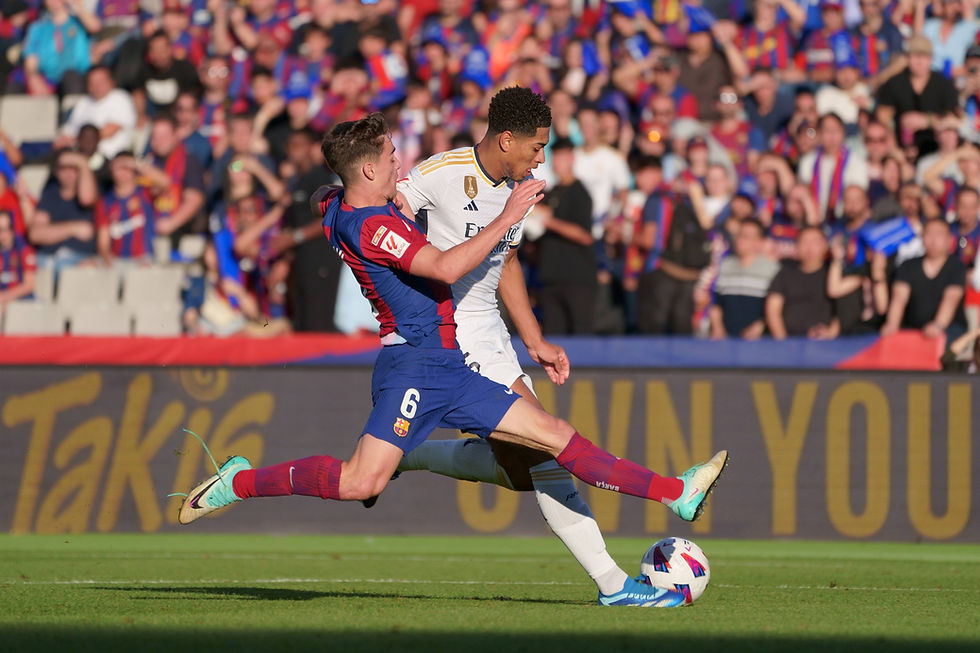If You Can’t Sign Him, Sue Him? The Most Interesting Transfer No One is Talking About
- Bryce Goodwyn
- Jun 24, 2022
- 3 min read
Updated: Jul 19, 2022
In the world of international soccer – or football as they implore it be called overseas – the process of player transfers can be considered quite hectic. The hectic nature of the transfer process is exacerbated when the impetus placed upon improving the overall squad strength by club executives must be fixed within biannual periods. Analogous to what the NCAA’s Transformation Committee has recommended for athletes entering the transfer portal, clubs are only permitted to sign players within two transfer windows – one designated for the summer period and one for the winter. As such, club managers and executives are working around the clock to find agreements for the players they believe will improve the quality of their overall squads for the forthcoming season.
Unfortunately for these clubs, their ability to sign players is oftentimes at the mercy of the party at the other end of the table. Because player transfers are affected by multiple factors, including weekly wage propositions, the quality of teams interested, and the desires of the players themselves, they can materialize and dissolve in the blink of an eye. Such drastic changes are typically met with little more than public criticism of the player. Nevertheless, a recent transfer to kick off the summer window could potentially become one of the most notorious in modern history due to the legal ramifications that could potentially follow in the coming months.
On June 10th, Arsenal of the English Premier League announced the signing of 19-year-old Brazilian forward Marquinhos from his previous club, Sao Paulo. Marquinhos, while an exciting prospect, is a player considered by manager Mikel Arteta and the Arsenal hierarchy as a player to be developed for the future. Though the North London club is certainly excited to close the first deal of what, according to reports, is proving to be a busy transfer window, they were not the only suitors of Marquinhos in the Premier League. In fact, they are not the only Premier League side to say they hold an agreement for the Brazilian forward.
After Arsenal had begun the process of negotiating for Marquinhos’ transfer, Wolverhampton Wanderers FC (Wolves) made public their disapproval of the negotiations. According to Wolves, Marquinhos had signed a pre-contract with them that would take effect once his contract with Sao Paulo expired in the summer. They had even reportedly arranged an agreement with Grasshopper Club Zürich, a club in Switzerland, to bring Marquinhos on a temporary loan deal to aid his development. Nevertheless, Arsenal swiftly entered negotiations for the player and, with the help of his agency, secured his transfer for a fee rising to 3 million pounds, or approximately $3.67 million.
Upon Marquinhos’ decision to join Arsenal, Wolves were left furious at what they believed to be a breach of contract between themselves and the Brazilian. Consequently, the club decided to consider legal action against Marquinhos in the near future. Allegedly, a Brazilian law firm has been called to file a complaint and open a formal litigation process in response to the player’s contract with Arsenal. And as if this transfer saga could not be any more complicated, it seems that Sao Paulo have attempted to justify reneging their agreement with Wolves by disputing the length of Marquinhos’ contract. In 2019, Marquinhos, then 16 years old, signed a 5-year deal with Sao Paulo, leaving him under their control under 2024. However, FIFA rules state that underage players are only allowed to sign contracts up to three years. Therefore, in accordance with FIFA’s rules, Wolves feel they were entitled to sign a player for free who, as of this year, was out of contract. However, because Sao Paulo believed their player was contracted until 2024, they felt it within their legal rights to earn a fee for his transfer to Arsenal.
Though it was later revealed that Wolves are unlikely to pursue legal action against Arsenal for the transfer, it remains to be seen whether their complaints against Marquinhos and Sao Paulo will evolve into formal litigation. Such a decision would certainly cost the club valuable time and resources that they arguably should be allocating toward strengthening the team. Regardless, the supposed vitriol held by Wolves toward the events of this transfer saga does not seem to be fading, and it will be fascinating to follow any legal developments that arise out of a contract dispute that spans three clubs and two continents.
Bryce Goodwyn is an incoming 1L at Regent University School of Law. While at Regent, he will be a member of the Honors Program and will work as a Dean’s Fellow during his 1L year completing research and administrative work. He also formed part of the recently established National Sports Legal and Business Society as the Regent University Chair. He can be found on Twitter @BryceGoodwyn and on LinkedIn as Bryce Goodwyn.







EPS Machine EPS Cutting…
EPS Machine Eps Raw…
EPS Machine EPS Recycling…
EPS Machine EPS Mould;
EPS Machine EPS Block…
EPP Machine EPP Shape…
EPTU Machine ETPU Moulding…
EPS Machine Aging Silo…
EPTU Machine ETPU Moulding…
EPS Machine EPS and…
EPS Machine EPS and…
AEON MINING AEON MINING
AEON MINING AEON MINING
KSD Miner KSD Miner
KSD Miner KSD Miner
BCH Miner BCH Miner
BCH Miner BCH Miner
EPS Machine EPS Cutting…
EPS Machine Eps Raw…
EPS Machine EPS Recycling…
EPS Machine EPS Mould;
EPS Machine EPS Block…
EPP Machine EPP Shape…
EPTU Machine ETPU Moulding…
EPS Machine Aging Silo…
EPTU Machine ETPU Moulding…
EPS Machine EPS and…
EPS Machine EPS and…
AEON MINING AEON MINING
AEON MINING AEON MINING
KSD Miner KSD Miner
KSD Miner KSD Miner
BCH Miner BCH Miner
BCH Miner BCH Miner